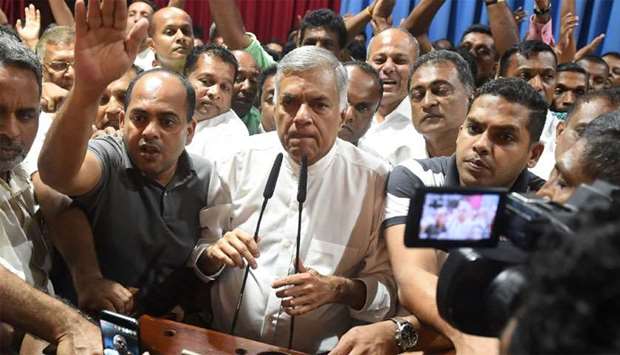Sri Lanka's sacked prime minister Ranil Wickremesinghe resisted moves to evict him from his official residence, officials said Sunday, as his controversial successor sought blessings at a prominent temple ahead of naming a new cabinet.
The new ruling party had given Wickremesinghe till Sunday morning to leave the Temple Trees official residence following his shock dismissal on Friday that has plunged the Indian Ocean island into constitutional turmoil.
Officials said police will now seek a court order to evict Wickremesinghe, whose security and official cars were also withdrawn by President Maithripala Sirisena on Saturday.
Wickremesinghe had earlier insisted Sirisena's dismissal of him was illegal and demanded an emergency session to prove he still commanded a majority.
Instead, Sirisena shut parliament for nearly three weeks to forestall any challenge against his appointment of former strongman Mahinda Rajapakse as the new prime minister.
Privately-run newspapers on Sunday described Sirisena's move as a ‘constitutional coup’ that has plunged the country into an unprecedented crisis.
All police leave was cancelled as tensions heightened in Colombo and more troops were seen near Temple Trees as well as the president's office.
Western nations have expressed concern and asked all sides to act with restraint and respect the constitution.
Meanwhile, Rajapakse travelled to a highly venerated Buddhist temple in the central district of Kandy to seek blessings from monks before naming a cabinet.
Rajapakse's aides said he was likely to name a few cabinet ministers later Sunday and begin work on Monday. He is yet to make a formal statement or address the nation since being elevated to the new post.
The former strongman is a controversial figure at home and abroad and presided over the crushing of a decades-long Tamil Tiger uprising.
He is seen as being closer to China than Wickremesinghe, who had sought to re-establish stronger ties with traditional ally and regional power India.
Official sources in New Delhi told AFP they were ‘closely watching’ developments in Colombo.

